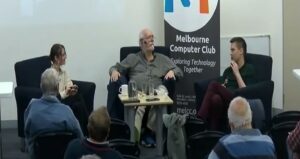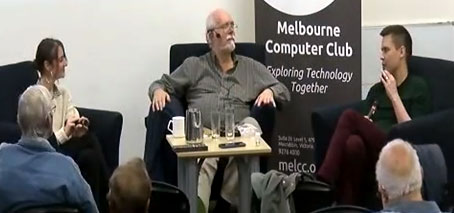
Iolanda Di Bernardo and Torben Daeneke speak with David Stonier-Gibson and the Melbourne Computer Club
What is the future of computing? As Moore’s law is approaching an end, new technologies are required to enable further advances in computational speed and energy-efficient data processing. As transistors took their first baby-steps over half a century ago, the next generation of electronic switches are being born today.
Engaging with the Melbourne computing and electronics community in a ‘fireside chat’ forum last week, FLEET’s Dr Torben Daeneke (RMIT) and Dr Iolanda Di Bernardo (Monash) explained to the audience what the intrinsic limitations of the current CMOS-based technology are, and what some of the approaches are that FLEET members are looking into to address these issues.
Torben spoke about how new synthesis methods can deliver materials that may be key to finding solutions.
Iolanda spoke about atomically-thin materials, how she fabricates them in the ultra-high vacuum synthesis chambers at Monash, and the concept of topological edge states.
The audience of around 20 were extremely interested in FLEET’s work, and spent about 90 minutes discussing chemistry, physics and electronics in a moderated panel discussion. Particular areas of interest included the synthesis methods of the materials, their versatility beyond the low-energy electronics applications, as well as the wider topic of research in Australia.
The ‘fireside chat’ type conversation was hosted by David Stonier-Gibson, President of the Melbourne Computer Club, who commented that “there was a lot of interest and questions from the other members, so it was a pretty lively and stimulating conversation.”
“Melbourne PC User Group is the world’s largest computer club, dating back to 1984 when the IBM PC was all the rage. We currently have 1400 members, with nice premises in Moorabbin. Facilities include a large meeting room with a good AV system, a maker room for electronics and a workshop with metal working machinery.”
“Iolanda and Torben were guests at a meeting of the Microcontroller SIG, one of the MPC’s approximately 40 Special Interest Groups (SIGs), whose members are specifically interested in electronics and related topics.”
“We all enjoyed hearing about the research being done on a broad front to develop novel methods of making active electronics devices.”
The Club initiated the contact after reading about Daeneke’s recent transparent electronics work in a story published on the electronics media platform Tech Briefs.

